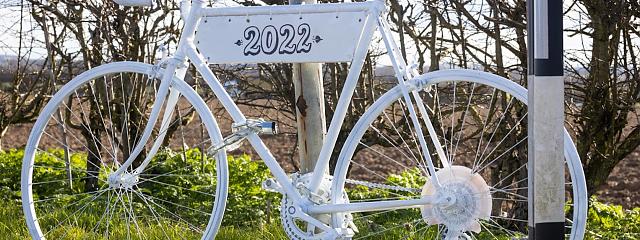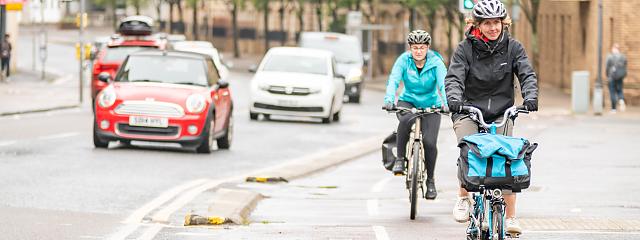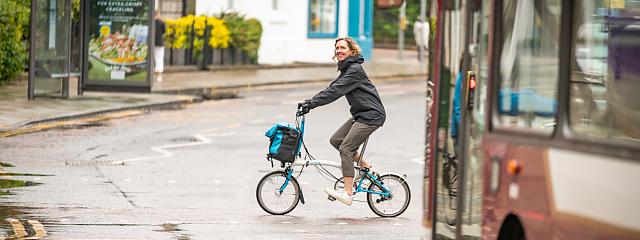
Report Card 2023 – is the Scottish Government delivering for cycling?
Report Card 2023 – is the Scottish Government delivering for cycling?
With MSPs heading back to Holyrood after their summer recess and government due to set out its programme of work for the year ahead, it’s a good opportunity to look back at progress made over the past year for cycling and sustainable transport.
This Programme for Government (PfG), expected on 5 September, will be the third of this parliament – since the 2021 election.
I have analysed the Scottish Government’s progress against its own commitments from the 2022 PfG, with the same method I used in last year’s report on progress, but this time there is also an assessment of how progress on delivering policies has changed since the previous report card.
Summary
Key
|
|
Zero progress or no information available |
|
|
Some progress made but commitment not met. Action may be ongoing or set for future |
|
|
Commitment met or positive progress in meeting future commitment |
Status change: Stable ( → ) Improved ( ↗ ) Worsened ( ↘ )
|
|
Commitment |
Status change from 2022 |
2023 status |
|
|
Active travel funding |
→ |
Commitment remains strong. Active travel budget boosted to £189m. Delays in funding for projects has caused widespread concern |
| New Cycling Framework for Active Travel | ↗ | Positive strategic framework published. Transformation Project ongoing | |
| Network Planning & Active Freeways | → | No progress made | |
|
|
Free bikes for kids |
→ |
Pilot schemes provided 3,800 free bikes by Mar 2023. Funding continues |
| Scotland Cycle Repair Scheme | ↘ | Successful project fixed over 80,000 bikes from Aug 2020 - Mar 2023. Scheme funding withdrawn by government for 2023/24 | |
|
|
20-minute neighbourhoods |
↗ |
Draft guidance for local authorities published and policy included in NPF4 |
| Safe to school initiatives | → | No information available | |
|
|
20mph zones |
↗ |
Planning work continues for rolling out 20mph zones across Scotland |
| Car km reduction Route Map | ↘ | Route Map consultation in 2022 but publication of final strategy delayed throughout 2023 | |
| Low Emission Zones | ↗ | Glasgow LEZ in force despite last-minute legal challenge. Bus restrictions have seen air quality improvements | |
| Mobility & scrappage scheme | N/A | Fund launched | |
| Dashcam safety portal | → | Remains in early stage of development | |
| Speed Management Review | → | No information available | |
| Fair Fairs Review | N/A | Ongoing | |
| Bus service regulation & support | → | Bus services decline but franchising regulation promised | |
| Promote free bus travel for under 22s | → | Nearly 1m young people benefiting – approx 70% of 12-21 year olds |
Mixed progress in the past year
A highlight of the past year was the new record level of funding for active travel in the autumn budget – it remains on course to reach at least £320m next year. A new strategy to guide government work on cycling for everyday journeys has been published and many policies which require long-term development have seen positive progress.
Despite this good effort, there have been notable delays to other policies which have knocked back overall progress. Notably, a coherent plan and process for developing and creating Scotland’s network of cycle lanes is still needed and the long-awaited route map outlining how car journey kilometres will be reduced remains unpublished.
In August, Glasgow and locations around Scotland hosted the UCI Cycling World Championships with government wanting its legacy to include encouraging cycling as a mode of transport for everyday cycling. To make this happen government must make significant progress over the next year on all its current commitments.
We particularly want to see action on four commitments, so that in 2024 we have:
- At least £320m allocated to active travel
- A fully formed plan and process to develop and deliver a national cycling network blueprint
- A Climate Change Plan and Route Map with strong measures to cut car dependency
- A National Dashcam Safety Portal launched and in use by Police Scotland
Funding
“Deliver record investment in active travel, including multi year funding…”
We welcomed another boost to the active travel budget when the total for walking, cycling and wheeling reached a record £189m for the current financial year, and government has reiterated the £320m pledge, most recently during the UCI Cycling World Championships in Glasgow.
In this autumn’s budget the finance secretary must make good progress towards the commitment to ensure “at least £320 million or 10% of the total transport budget goes on active travel by 2024-25”.
For Cycling UK, the £320m for active travel is a non-negotiable, red line commitment.
We recognise the financial constraints on government with inflation, post-Covid recovery and the need to address the cost-of-living crisis; however, we know that apportioning 10% of the overall transport pot to active travel provides excellent value for money and is proportionate compared to the billions spent on road building.
In addition to the overall budget, we also need to analyse how the money is spent.
Since the start of this financial year the Scottish Government has severely delayed getting money out of the door to fund projects which work directly with people to get ‘bums on saddles’. Disappointingly, some projects received reduced funding, such as Bikeability, or were cut completely, like Cycling UK’s successful Scotland Cycle Repair Scheme (SCRS).
The majority of Scotland’s £189m active travel budget is capital funding to pay for cycle lane construction or iconic schemes, such as the Stockingfield Bridge in Glasgow. However, resource funding is also needed to pay for projects which help people with access to a bike and developing the skills and confidence to cycle.
Research shows that governments and funders get the best bang for their buck if they apportion 20% of their budget to resource funds – currently the Scottish Government allocates only 7%.
It’s of limited value if Scotland builds a fine network of cycle lanes but the people who need it most don’t feel it’s for them, don’t own a bike or can’t ride one.
In addition, government has not yet found a way to meet its own PfG commitment for multi-year funding which would provide certainty and security for projects which often need to work with communities for several years to see maximum benefit.
Verdict: Commitment mostly met – action needed on long-term funding, funding timeliness and balance.
Cycling strategy
“A new Cycling Framework for Active Travel – to be published in 2022”
Transport Scotland published a Cycling Framework for Active Travel in 2023 – Cycling UK praised the Scottish Government for “producing a positive new strategy aimed at creating safe cycling infrastructure”.
As part of the framework, government has been taking time to consult and consider in a strategic way how it can best spend the increasing amounts of money allocated to boost cycling, walking and wheeling.
This Transformation Project was due to conclude at the end of 2022, although government has still not published findings or recommendations, and without this, uncertainty remains about government plans for funding processes, active travel network design and implementation, and project delivery in the future.
In January government set up a new £20m Transformation Fund to pay local authorities and public bodies to deliver active travel infrastructure projects. We wait to see if government wants to continue this model of directly funding councils.
We also need to understand how the new deal with local government will affect the role of councils and charities like Cycling UK in funding and delivery of local active travel projects.
Verdict: Commitment met – Framework in place but detail needed on delivery plan to drive forward a step change in action for cycling.
Space for cycling
“Establishing an active freeway network for Scotland, comprising local networks within towns and cities and connecting settlements and major destinations with high quality, safe routes”
The fourth National Planning Framework (NPF4) published in February included a National Walking, Cycling and Wheeling Network as a national development, thereby giving it a high status in local planning strategies.
The cycling framework clearly committed government to ‘create a network blueprint for Scotland’ and funding has been provided for creating cycle lanes and infrastructure. However, there remain big questions about how government and local councils will collaborate to create a national cycling network, including through the delivery of government’s active freeways policy.
We want to see national and local governments working together in Scotland to urgently plan a coherent network, organise and phase it’s construction, and communicate the vision to communities.
Safe cycling infrastructure is what people consistently tell us is needed in Scotland: 75% of people stated in a survey that ‘more cycle lanes, traffic free routes and cycle paths’ would be important in encouraging them to cycle more for routine journeys.
Verdict: Commitment not met – disappointing lack of information and action.
Access to bikes
“Deliver…. access to bikes through schemes such as the Scotland Cycle Repair Scheme 2 and free bikes for school‑age children who are unable to afford one”
‘Free bikes for kids’ was a big commitment from the SNP at the 2021 election and since then a number of projects have been piloting ways to make this happen. To March this year, 3,800 bikes were provided to children in Scotland and this work continues into 2024.
Government is also trialling non-ownership models of bike access for children and adults such as Bike for Good’s Switch Up scheme. Cycling UK is proud to be at the forefront of this work, by delivering the new £1m Cycle Share Fund.
As stated above the funding for our Scotland Cycle Repair Scheme was cut despite a hugely successful programme of work and over 80,000 bikes fixed in two and a half years to March 2023.
Verdict: Positive efforts testing new ways to get a bike, but SCRS cut disappointing.
Better neighbourhoods
“Over the course of this Parliament, we will deliver on our vision for ‘20-minute neighbourhoods’: places where people can have their needs met locally within a 20‑minute walk from their homes, reducing emissions and encouraging active travel”
Government has put more flesh on the bones of the 20-minute neighbourhood policy in the last year. NPF4 included 20-minute neighbourhoods as a policy and as a consequence, local authorities will need to consider this policy in their planning decisions.
Government also consulted on guidance which councils will have to use when developing their plans for local living – the guidance was on the whole a positive document.
Verdict: Progress made – policy needs further embedding.
“We will work with local authorities to encourage more Safe to School initiatives, with the aim of ensuring every child who lives within two miles of school is able to walk or wheel safely”
As with our analysis last year, little has been done for a wide roll out across Scotland of Safe to School initiative such as School Streets.
Verdict: No progress made on wider roll out.
“Roll out our national strategy for expanding 20mph zones, with more roads and areas reducing their speed limits to 20mph”
This statement in the 2022 PfG reiterated, although slightly weakened, the commitment from 2021 to “ensure all appropriate roads in built-up areas have a safer speed limit of 20mph by 2025”.
Transport Minister Fiona Hyslop recently confirmed in a letter to Cycling UK that local authorities have been provided with funding to identify the roads to receive the new 20mph limits, and “once analysed it will enable the multi-partner 20mph Task Group to scope next steps and options for implementation by 2025”.
However, we understand that this work is progressing more slowly than hoped.
Verdict: Progress made – urgent action needed to meet 2025 deadline.
Road Traffic Reduction
“Produce a route map to reduce the use of cars – measured as ‘car kilometres’ – by 20% by 2030”
Government consulted on a draft route map plan to reduce car use late in 2021. Frustratingly, over 18 months later a final plan has still not been published so we don’t know what new measures government plans to introduce in the years to come.
The Route Map is expected to be published later in 2023 and is highly likely to mirror measures aimed at tackling climate emissions from transport within the forthcoming draft Climate Change Plan – due to be scrutinised by the Scottish Parliament in November.
We need the Route Map to indicate how government intends to rebalance our transport system, put an end to car dependency, and provide people with real transport choices.
This must include tougher measures to achieve the 20% commitment by 2030 including measures to make the car a less attractive option.
Verdict: Unacceptable delays – action urgently needed.
“Introduce low emissions zones in four of Scotland’s cities – setting vehicle emissions limits for entry to certain road spaces, and restricting access for the most polluting vehicles”
The Low Emission Zone (LEZ) policy was included in the above draft Route Map and is already seeing benefits for people in Glasgow.
Glasgow’s LEZ came into force for some cars in June this year, despite a last-minute legal challenge. The rules have applied to buses for some time and are already seeing results in improved air quality in Glasgow.
LEZs for Edinburgh, Aberdeen and Dundee are already in place with enforcement starting in May/June 2024.
Verdict: Good progress.
“Test a new mobility and scrappage scheme to help low income households to replace a polluting vehicle with the means to travel sustainably”
In February 2023 government launched the Mobility and Scrappage Fund. This pilot scheme incentivises the scrapping of polluting vehicles and also provides grants which can go towards the purchase of a bike or e-bike.
Verdict: Too early to say.
Road Safety
“Work with Police Scotland to develop a one-year pilot project to develop an online reporting system, enabling anyone to upload camera footage of dangerous driving”
Cycling UK in Scotland has led the campaign for the National Dashcam Safety Portal since 2020 helping to secure the government commitment to develop the online tool in 2022.
Since then, financial constraints have led to a delay although Transport Minister Fiona Hyslop recently confirmed to Cycling UK that the scheme remains in development.
“We will undertake a National Speed Management Review”
A welcome commitment to a review of speed limits in Scotland was included in the Road Safety Framework Annual Delivery Plan 2021- 2022. Recently, Mark Ruskell MSP asked the Scottish Government whether it will provide a progress update on the National Speed Management Review and is awaiting a response.
Verdict: Frustrating delays affecting road safety.
Public transport
“Freeze ScotRail fares until March 2023, and complete a Fair Fares Review”
Transport Scotland is progressing with a review of public transport fares which is due to report at the end of 2023.
Scotrail fares were frozen until March but increased by 4.8% in July 2023.
As part of the Fair Fares Review, a pilot for the removal of ScotRail peak-time rail fares will run for six months starting October 2023.
“Introduce regulations to enable bus franchising and Bus Improvement Partnerships, giving local authorities more options to improve bus services”
Transport Scotland made this commitment last year but plans to bring forward franchising regulations are due by the end of 2023.
“Continue the Network Support Grant to support bus services by keeping fares at more affordable levels and networks more extensive”
The Network Support Grant Plus was brought in to support bus companies through Covid – it ended in March 2023.
Bus services in Scotland are in a worrying decline – which Scottish Labour recently highlighted.
“Further promote free bus travel for those under 22 to improve uptake”
Nearly 1m young people are now benefiting from a free bus pass, including approximately 70% of 12-21 year olds.
Verdict: Mixed – more effort needed on public transport.













